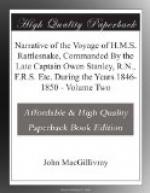After crossing this river we again turned inland for a short distance, and camped by the side of a small river south of the last; with steep grassy banks on the north side, overhung by Tristanias and arborescent Callistemons. On the south side grew mangroves, and the large blue-flowered Ruellia seen at our first camp. The tide ran up to our camp, the fresh water coming from the north-west. There were plenty of waterholes in the valley, between the river and the higher sandy ground. The grass here consisted principally of Agrostis, near the river, where the land is occasionally inundated, and of Uniola, a little further back, growing in tufts. On the sandy ridges, however, there was little else than Xanthorrhoea, Xerotes, and Restio (rope grass). Here we saw a great many native companions (Grus antigone), and swamp pheasants (Centropus phasianus).
June 24.
Mr. Kennedy and a party of five men again proceeded to examine the swamps, but returned without finding any practicable way of crossing.
June 25.
We started early this morning, proceeding towards the beach in a southerly direction, the river turning again south by west, and camped after travelling over five or six miles of rotten and rather sandy ground.
June 26.
We proceeded along the beach till we came to a small river, most probably the same we left yesterday, which we attempted to cross in the same manner as we had done the one on the 23rd, but unfortunately the horses and carts sank so deeply into the mud that they were completely set fast. We were now obliged to unload, and carry the goods ashore. Some of the flour-bags fell into the water, but were quickly taken out—very little damaged. We had great difficulty in getting the carts out of the mud.
A number of natives had accompanied us all day, and pointed out to us the best place to cross the river. Some of them also assisted us in carrying our things across, while one or two attempted petty thefts. I caught one with two straps belonging to a saddle, and a pair of Mr. Kennedy’s spurs in his basket, which I took from him and sent him away. Many of these natives were painted all over with a sort of red earth, but none of them had visited us armed with spears for several days past. Some of them had learned to address several of our party by name, and seemed pleased when they received an answer. We frequently made them small presents, and endeavoured to impress upon them the anxiety we felt to remain on friendly terms with them.
After having crossed the river we turned inland; cutting our way through a belt of mangrove scrub, about half a mile wide; we got the carts through with comparative ease, the ground being harder than usual. We camped on a rising ground, with good grass around us, by the side of a small creek running here almost parallel with the beach, and coming from the westward. At this camp I obtained seeds of a dwarf spreading tree, with alternate, exstipulate, pinnate leaves, and axillary racemes of a round flattened fruit, similar in size and shape to the small blue fig cultivated in gardens, of a dark purple colour, and possessing a flavour similar to an Orleans plum when hardly ripe, with a hard rough stone inside.




